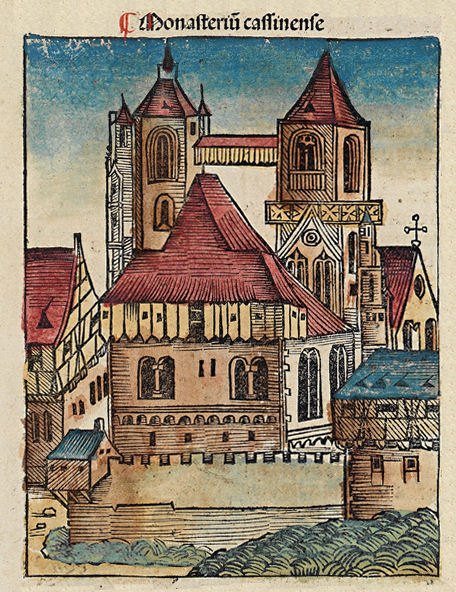Blessed Schuster’s Daily Thoughts on the Rule: Friday after the Fourth Sunday of Lent
Friday after the 4th Sunday of Lent
Station at St Eusebius
The Resurrection of Lazarus
1. The Station is at the titulus of Eusebius on the Esquiline, where lay the burial fields for common folk, executed criminals, and slaves.
The Gospel reading recounts the resurrection of Lazarus.
The sisters of the infirm Lazarus send a messenger to Jesus to inform Him of the gravity of the illness; but the Saviour does not move: distulit sanare [He delayed to heal]—observes Saint Augustine—ut possit resuscitare [that He might raise up].
When it seems that God refuses a grace of a lesser degree, He is then preparing one of greater value.
At Subiaco, He did not deliver Saint Benedict from the snares of the priest Florentius, because He wanted to transplant the Benedictine tree to the summit of Cassino, in order to shine from there on the whole world the light of the Regula Monasteriorum.

He likewise permitted the destruction of Monte Cassino on the part of the Lombards, because He wanted to transplant Saint Benedict’s little tree to Rome, at the Lateran. The ways of God are hidden, but marvellous. Quis agnovit sensum Domini, aut quis consiliarius eius fuit? (Rom 11:34) [‘Who hath known the the thought of the Lord, or who hath been His counsellor?’—tr.]
At Naples, the Servant of God Don Michele Ietti once told me: ‘He who sets himself to search out God’s mind [lit. ‘to search out where God has His head’—tr.], ends up by losing his own!’
***
2. The Apostles, in their prudence as Galilean fishermen, advise the Divine Master against returning to Judea. ‘Lord, a little while ago the Jews wanted to stone You, and You are returning there again?’
‘Are there not twelve hours in the day?’, replies the Saviour. ‘He who travels by day does not stumble because he sees. But he stumbles who travels by night, in the dark.’
His meaning was: For Christ, there is no unforeseen risk. Everything for Him is light, and on His divine providence depends the succession of human events.
This thought helps greatly to confirm our tranquillity in the arms of God. In manibus tuis tempora mea. [Ps 30:16: ‘In Thy hands are my times.’—tr.]1 Not a leaf falls—says the proverb—that God does not wish.2
It is this abandonment to God’s good pleasure which confers on the saints such an angelic aspect.
Erat vir Domini Benedictus vultu placido, moribus decoratus angelicis; tantaque circa eum claritas excreverat, ut in terris positus, in caelestibus habitaret. (From the Monastic Antiphonal, 21 March: ‘The man of God, Benedict, had a peaceful face, adorned as he was with angelic ways. He was surrounded by a sort of heavenly atmosphere, whence it seemed that, while still being here on earth, he already dwelt in Heaven.’)
This is the fruit of union with God, according to Paul’s teaching: Qui adheret Domino, unus spiritus est. (1 Cor 6:17: ‘He who is united to the Lord participates in His Spirit.’)
***
3. At the tomb of Lazarus Jesus sheds tears, groans, and shows His profound sorrow for His deceased friend. Even the Jews who are hostile are forced to acknowledge: See how much He loved him!
The Redeemer is always faithful in His friendships. When men fail us in our greatest need, Jesus Christ runs to our aid.
Thus of creatures we say, Omnis homo mendax [Ps. 115: ‘Every man is a liar’—tr.], in the sense that every human hope is deceiving.
Instead, seven times a day we direct to God the prayer: Domine, ad adiuvandum me festina. [Ps. 63: ‘O Lord, make haste to help me.’—tr.]
Saint Benedict teaches that this aid is so prompt that it even precedes our prayer:
Antequam me invocetis, dicam vobis: Ecce adsum. Quid dulcius nobis ab hac voce Domini invitantis nos, fratres carissimi? Ecce pietate sua demonstrat nobis Dominus viam vitae. (Rule, Prologue: ‘Even before you call upon Me, I answer you: Here I am. What can be sweeter, O dearest brethren, than this voice of the Lord Who invites us? Behold, in His goodness the Lord points out to us the path of life.’)
1The Vulgate gives in manibus tuis sortes meae, ‘in Thy hands are my lots.’ The reading above (tempora mea) is found in the Roman Missal in the Offertory for the 13th Sunday after Pentecost; the same text is used as the Offertory for the Nuptial Mass.—tr.↩
2In Italian, the proverb is a rhyme: ‘Non cade foglia / che Dio non voglia.’—tr.↩
